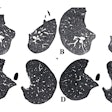Wednesday, December 1 | 1:30 p.m.-2:30 p.m. | SSMS05-3 | Room TBA
A deep-learning algorithm trained on only normal head CT exams can triage emergency cases for priority review by radiologists, according to this presentation.In an effort to overcome the perceived limitations of previous deep learning-based triage systems, a team led by presenter Seungjun Lee of Asan Medical Center in Seoul, South Korea, used normal studies to develop a generative adversarial network (GAN) designed to identify anomalies and prioritize emergency cases for radiologists. The algorithm also highlights suspected lesions on the images to aid radiologists during interpretation.
After testing the model on a cohort of patients who had received brain CT for suspected neurologic conditions at their emergency department, the researchers found that their algorithm yielded an area under the curve of 0.86 for identifying emergency cases. What's more, a clinical simulation test showed that the triage system was able to cut wait times from 243 seconds to 42 seconds and lower radiology report turnaround time from 262 seconds to 63 seconds for these cases, according to the Lee and colleagues.
Check out this talk on Wednesday to learn more.





















